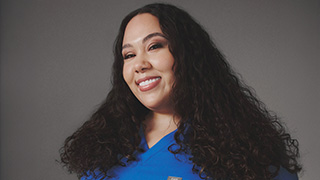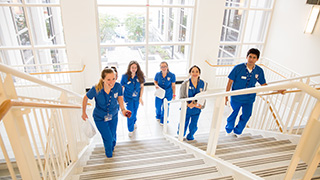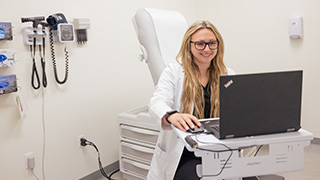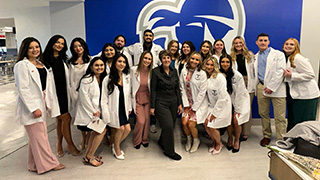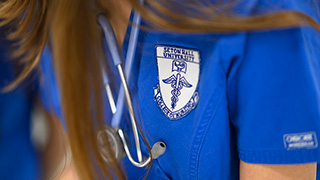Nurturing Nurse Leaders: Collaborative Learning at Immersion Session
Sunday, November 26, 2023
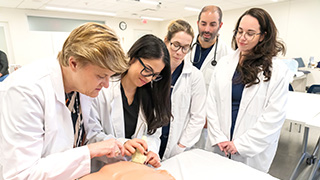
During a recent immersion session for the College of Nursing's Adult-Gerontological Acute Care Nurse Practitioner graduate students, undergraduate nursing students were also invited to participate.
The College of Nursing recently hosted an immersion session at the Interprofessional Health Sciences campus, designed for its Adult-Gerontological Acute Care Nurse Practitioner (AG-ACNP) students. This event was a blend of academic rigor and practical application, where undergraduate B.S.N. students were also invited to participate. The session provided a unique platform for both sets of students to engage in hands-on learning experiences, bridging the gap between classroom theory and real-world nursing practice.
"The undergraduates were excited to have this opportunity to learn and work with the graduate students. Both the B.S.N. and AG-ACNP students expressed they enjoyed working collaboratively in this simulation," said Associate Professor Mary Ellen Roberts, D.N.P., R.N., A.P.N.C., who also serves as chair of the graduate nursing department and director of the AG-ACNP program. "This approach not only fosters technical competence but also nurtures the personal and professional growth of future nurses and nurse practitioners."
Roberts commented that the immersion session itself was a carefully orchestrated event, combining high-fidelity simulations, overseen by Kathryn Sanok, M.S.N., R.N., coordinator of the Clinical Skills Lab, along with hands-on training supervised by faculty in advanced procedures like arterial and central line insertion, lumbar puncture, and thoracentesis.
Grace Maldonado, an undergraduate from Bellmore, New York, highlighted the immersive nature of the training: "I felt that I was involved in an active emergency as a nurse." She described a memorable instance: "The nurse practitioners would call out the medication they needed, and I would clarify the order along with prepare the medication in a timely manner."
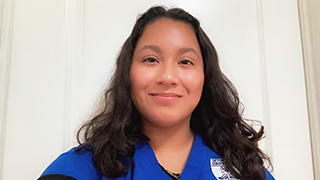
Jasmine Campos, B.S.N. student.
Jasmine Campos, an undergraduate from Bergenfield, New Jersey shared her perspective, focusing on the reinforcement of critical skills. "Assessment skills are important in any scenario — they help you make a clinical decision to help your patient that is justified by your critical thinking." She described the immersion as a "solid review of what we learn in nursing school." She also spoke about the importance of teamwork, recalling how the interaction with the graduate students she worked with went smoothly in terms of communication.
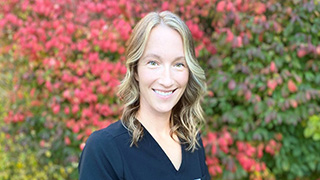
Megan Byler, student in the Adult-Gerontological Acute Care Nurse Practitioner program.
Megan Byler, a graduate nursing student from Dover, Deleware, highlighted the practical benefits of the in-person immersion. "Having the opportunity to practice skills like intubations, central lines, a-lines, lumbar punctures, and chest tubes has given me an advantage over other future nurse practitioners." Byler, who is enrolled in the AG-ACNP program, emphasized the program's unique structure. "The flexibility of an online program with the scheduled in-person immersions has allowed me to continue working and gaining experience as a nurse."
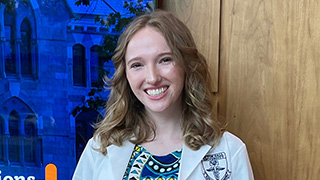
Olivia McCue, B.S.N. student.
Olivia McCue, an undergraduate from Pinehurst, North Carolina, appreciated the interprofessional collaboration. "I really enjoyed interacting with the NP students, both in and out of the simulation." She also shared her broader experiences at Seton Hall, adding that she has had the opportunity to do research with the speech-language pathology graduate students, as well as serve on the Educational Policy and Academic Integrity Committees.
"These activities were designed to mimic real-life medical emergencies, providing the undergraduate students with an authentic taste of the pressures and demands of nursing in acute care settings," said Assistant Professor Afua Ampiaw, Ph.D., RN, who teaches Synthesis Practicum, a capstone clinical course which prepares B.S.N. students for transition to professional practice.
Roberts added, "The students' feedback collectively emphasizes Seton Hall's dedication to providing a comprehensive, real-world educational experience. The program's unique combination of online learning, immersive in-person sessions, and interprofessional collaboration prepares students for diverse career paths in nursing, from emergency settings to obstetrics and pediatrics."
Categories: Health and Medicine

